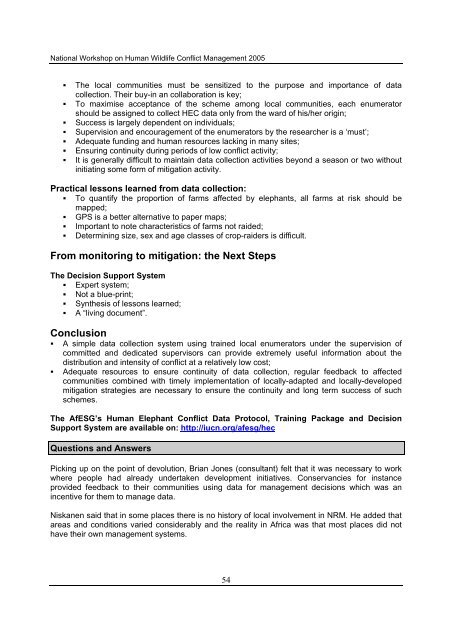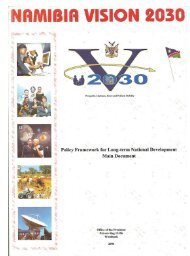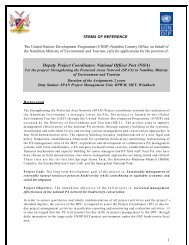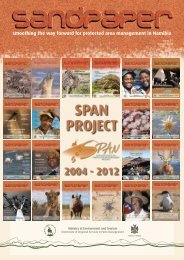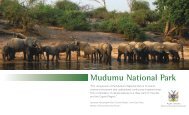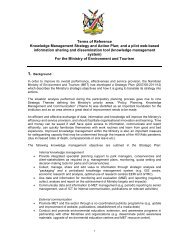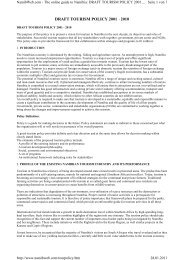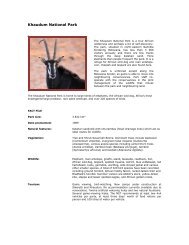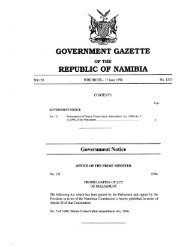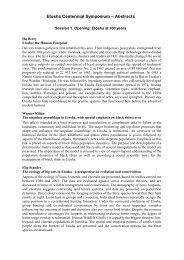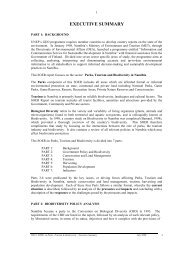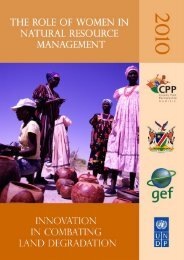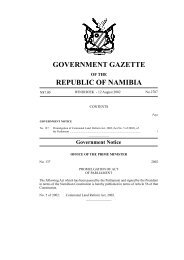HWCM - Ministry of Environment and Tourism
HWCM - Ministry of Environment and Tourism
HWCM - Ministry of Environment and Tourism
You also want an ePaper? Increase the reach of your titles
YUMPU automatically turns print PDFs into web optimized ePapers that Google loves.
National Workshop on Human Wildlife Conflict Management 2005<br />
• The local communities must be sensitized to the purpose <strong>and</strong> importance <strong>of</strong> data<br />
collection. Their buy-in an collaboration is key;<br />
• To maximise acceptance <strong>of</strong> the scheme among local communities, each enumerator<br />
should be assigned to collect HEC data only from the ward <strong>of</strong> his/her origin;<br />
• Success is largely dependent on individuals;<br />
• Supervision <strong>and</strong> encouragement <strong>of</strong> the enumerators by the researcher is a ‘must’;<br />
• Adequate funding <strong>and</strong> human resources lacking in many sites;<br />
• Ensuring continuity during periods <strong>of</strong> low conflict activity;<br />
• It is generally difficult to maintain data collection activities beyond a season or two without<br />
initiating some form <strong>of</strong> mitigation activity.<br />
Practical lessons learned from data collection:<br />
• To quantify the proportion <strong>of</strong> farms affected by elephants, all farms at risk should be<br />
mapped;<br />
• GPS is a better alternative to paper maps;<br />
• Important to note characteristics <strong>of</strong> farms not raided;<br />
• Determining size, sex <strong>and</strong> age classes <strong>of</strong> crop-raiders is difficult.<br />
From monitoring to mitigation: the Next Steps<br />
The Decision Support System<br />
• Expert system;<br />
• Not a blue-print;<br />
• Synthesis <strong>of</strong> lessons learned;<br />
• A “living document”.<br />
Conclusion<br />
• A simple data collection system using trained local enumerators under the supervision <strong>of</strong><br />
committed <strong>and</strong> dedicated supervisors can provide extremely useful information about the<br />
distribution <strong>and</strong> intensity <strong>of</strong> conflict at a relatively low cost;<br />
• Adequate resources to ensure continuity <strong>of</strong> data collection, regular feedback to affected<br />
communities combined with timely implementation <strong>of</strong> locally-adapted <strong>and</strong> locally-developed<br />
mitigation strategies are necessary to ensure the continuity <strong>and</strong> long term success <strong>of</strong> such<br />
schemes.<br />
The AfESG’s Human Elephant Conflict Data Protocol, Training Package <strong>and</strong> Decision<br />
Support System are available on: http://iucn.org/afesg/hec<br />
Questions <strong>and</strong> Answers<br />
Picking up on the point <strong>of</strong> devolution, Brian Jones (consultant) felt that it was necessary to work<br />
where people had already undertaken development initiatives. Conservancies for instance<br />
provided feedback to their communities using data for management decisions which was an<br />
incentive for them to manage data.<br />
Niskanen said that in some places there is no history <strong>of</strong> local involvement in NRM. He added that<br />
areas <strong>and</strong> conditions varied considerably <strong>and</strong> the reality in Africa was that most places did not<br />
have their own management systems.<br />
54


